astrological reading for the non-believers
missed the chance to name this post "the fault in our stars"
Estimated reading time: 19 minutesIt’s 2024, and astrology, that ancient system of interpreting the stars, has made a remarkable comeback, as if the internet collectively decided, "Yeah, science is cool, but what does Mercury think?"
And honestly, in a world that seems to get more chaotic by the minute, maybe there’s something charming about Venus retrograde being the one to be blamed for your bad date.
Sure, on the surface, it feels a bit ridiculous.
After all, we’re no longer charting the stars to predict war or the next royal heir (unless you count celebrity baby announcements), but somehow, astrology keeps finding its way into modern life. People who know the Earth is round and trust vaccines also somehow believe that their love life is doomed because Mars is in the wrong house. It’s like we’ve come full circle—back to ancient times but with meme culture fueling the cosmic fire.
Both sides of the astrology debate often find themselves locked in a quiet but persistent struggle. On one side, believers see astrology as a comforting lens through which to view the world, a framework that offers explanations for life's uncertainties. For them, the stars provide meaning, a sense of cosmic order in a chaotic world. Astrology enthusiasts are often open to the idea that not everything can be explained by logic alone—sometimes, it’s about intuition, fate, and the alignment of forces beyond our control.
On the other hand, non-believers—often grounded in science and rationality—see astrology as a misguided attempt to impose order where there is none. They struggle with the idea that, in an age where scientific discovery has explained so much about the universe, people still turn to something so unprovable. To them, it’s a step backward, a rejection of progress.
The conflict lies in this: for astrology believers, non-believers appear dismissive of the emotional and spiritual significance astrology provides. Meanwhile, non-believers feel astrology undermines rational thinking and the value of evidence-based understanding. It’s a clash not just of belief systems, but of worldviews—how we seek to make sense of an ever-complicated world.
But here’s the thing: maybe, just MAYBEEE, we’re all just looking for a little meaning in the madness?
1. a starrily global sensation
Astrology is currently having a cultural moment—think 2010 K-pop era vibes but with more memes and probably more charts. What started with the powerful rise of personal computers has now evolved into a full-blown astrological renaissance, speeding along the information superhighway of the Internet and careening wildly through the meme-laden streets of social media.
In fact, according to a 2017 Pew Research Center poll, 29% of Americans believe in astrology, but that’s just the tip of this cosmic iceberg.
This surge in belief is especially pronounced among the younger crowd. A National Science Foundation survey reveals that 44% of 18- to 24-year-olds consider astrology to be somewhat or very “scientific.” It’s no wonder then that online horoscope sites are seeing a massive uptick in traffic.
The number of people who know their sun sign, check their horoscope, or casually creep on their partner's zodiac compatibility? Much, much higher. “New spirituality is the new norm,” declared WGSN, a trend-forecasting company (yes, that’s a thing), who released a report some years ago tracking millennials’ obsession with full-moon parties, alternative therapies, and, of course, astrology.
Astrology is basically the new psychoanalysis. Remember back in the day when you'd overhear cocktail party debates about id, ego, and superego? Now, it's all about the big three: sun, moon, and rising signs. And it's not just your kooky neighbor or your crystal-hoarding aunt talking about it. Nope, it’s the same people who probably believe in climate change, vaccines, and the roundness of the Earth. There’s no cognitive dissonance here—these are folks who comfortably see no contradiction between trusting science and also thinking that Venus in Scorpio explains their relationship drama. Naturally, this is giving birth to a whole new generation of astrology practitioners who are capitalizing on this cosmic craze.
The corporate world, with its ever-vigilant eye on consumer appetites, has noticed the trend. Big surprise. The rise of astrology is usually chalked up to two major factors: the decline of organized religion and the increase in economic uncertainty. It’s part of a larger shift toward New Age thinking—alternative spirituality with a side of "maybe the universe has my back because the economy sure doesn’t."
But then, there’s also the sheer political anxiety of the times. Historically, people tend to turn to astrology when the world around them feels like it's going up in flames. Case in point: the very first astrology column appeared in August 1930, post-stock market crash, for the British tabloid *Sunday Express*. And what was the occasion? Oh, nothing major—just the birth of Princess Margaret. "What the Stars Foretell for the New Princess" was an instant hit. It was such a nice distraction from the utter financial disaster that the paper decided to make it a regular feature.
Fast-forward to the 2008 financial crisis, and you’ll see Wall Street bankers doing the same thing. Seriously. Gordon, who runs a popular online astrology school, started getting calls from investment bankers post-2008 collapse. When the 401(k)s and stock options crumbled, people weren’t turning to market analysis; they were calling astrologers.
Because why not? When nothing in life makes sense, astrology swoops in with vague but comforting answers. And if you thought it stopped there, think again. Astrologer Colin Bedell, aka Queer Cosmos, pointed to the 2016 U.S. election as a major tipping point for astrology’s resurgence. “In the Obama years, people liked astrology. In the Trump years, people needed it,” Bedell said, summing up the entire cosmic mood shift.
Astrology’s roots run deep. As historian Benson Bobrick explains in his book The Fated Sky, the idea behind astrology is that a person’s fate is mapped out in the stars at the moment of their birth.
And this isn’t some new-age mumbo jumbo.
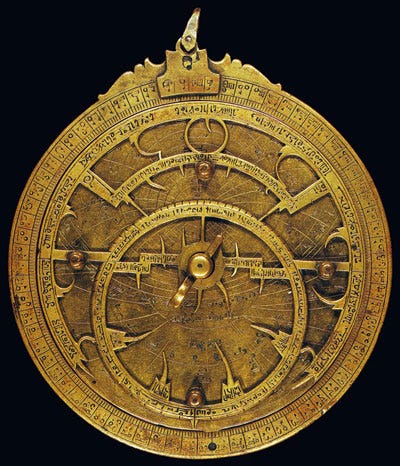
Astrology has been around since ancient Mesopotamia, spreading through Egypt, Greece, Rome, and the Islamic world. Back in the day, it wasn’t just about figuring out if you were compatible with a Gemini—it was serious business. People used astrology to plan when to plant crops, go to war, and even predict who might ascend to the throne. When astrologer Theogenes cast Augustus’s chart, he reportedly gasped and threw himself at Augustus’s feet. That’s the kind of drama astrology can bring.
It wasn’t just ancient rulers who got in on the action. Fast-forward a few centuries, and you've got U.S. President Theodore Roosevelt keeping his birth chart on a table in his drawing room. It wasn’t all fun and games though—astrology also had a bit of a spy thriller moment during WWII when the Allies distributed fake astrology magazines to throw off German U-boat operations. Yes, you read that right. Meanwhile, Ronald Reagan’s chief of staff confirmed that Reagan consulted an astrologer before making almost every major decision—whether it was announcing his re-election bid, invading Grenada, or having arms talks with Gorbachev.
Astrology, it turns out, isn’t just about what the stars say—it’s about how people use those messages to make sense of their chaotic lives. Whether you’re a 1930s princess, a 2008 banker, or a 2020s millennial, astrology offers the same thing: a bit of cosmic clarity in uncertain times. And right now? We could all use a little bit of that.
2. cosmic therapy at your fingertips
You’re scrolling through your feed one day, and bam—there it is. A meme that says, “Your horoscope this week: Major changes ahead. Stay flexible, and prepare for life-altering events.”
You pause.
You’ve been casually following astrology for years, using it as a way to explain everything from your bad dates to why you seem to always feel “off” during eclipse season. But lately, a little voice in your head has started to ask: Should you still be trusting astrology?
Astrology has long been credited with explaining everything from natural disasters—like Saturn’s movements triggering earthquakes—to cultural shifts, such as the rise of social media, thanks to an increase in Cesarean births during business hours, leading to a surge of suns in the tenth house, which rules status and reputation.
But what pulls most people toward astrology these days is less cosmic calamity and more self-exploration. Psychological astrology, heavily influenced by Carl Jung, views the birth chart as a mirror for the psyche, helping individuals understand their potential, purpose, and inner world. Think of it as therapy, but without the drawn-out analysis of childhood trauma—astrology promises much quicker insights and, often times, clearer instructions.
Astrology, in many ways, is a cosmic weather forecast. Sometimes it seems to line up with your life, sometimes it doesn’t, but it’s always interesting to see what the stars suggest. But should you be trusting it to guide your actions? That's where it gets trickier.
Humans are meaning-makers. We see patterns in the chaos of life because we want answers—why didn’t that job interview go well? Why are you suddenly feeling more emotional than usual? Astrology swoops in and gives you a neat little package to explain it all: “Mars is in retrograde,” or “You’re in your Saturn return.” It feels good to have explanations.
From a psychological perspective, astrology can be like a filter you apply to your problems. Need to explain why you’re feeling out of sorts? Blame it on the moon. Trying to figure out why your relationship is rocky? Mercury retrograde, of course. It’s like having a magical framework for understanding life’s twists and turns. But filters, as we know, don’t always show the full picture. Relying too heavily on astrology might keep you from facing the more complex truths that exist beneath the surface.
For instance, maybe it’s not just the stars that are causing you to feel anxious—it could be stress from work or a lack of sleep. Perhaps the issues in your relationship stem from communication struggles rather than external cosmic forces. Astrology provides insight into the “what,” but sometimes the “why” requires a deeper look.
Despite its mystical reputation, astrology doesn’t claim to predict the future. Instead, an astrologer’s role is to help the client better understand themselves, to reflect who they are in a language that feels both ancient and deeply personal. The way astrology frames human behavior makes it easier for people to accept their quirks—and to be kinder toward the quirks of others. That friend who crashes on your couch and never leaves? It’s not that she’s inconsiderate; she’s just a Taurus, and she can’t help herself.
Astrology offers a way to talk about personality traits without passing judgment. The AstroTwins, popular astrologers, compare it to sneaking medicine into a dog’s peanut butter. You could tell someone they’re selfish, and they might bristle. But if you say, “You’re a Leo. You need the spotlight,” they’ll likely embrace it.
Once a practice that required astronomical knowledge and manual calculations, astrology is now just a few clicks away. Free online chart generators, YouTube tutorials, and a variety of apps have made astrology more accessible than ever.
One of the most notable apps, Co-Star, was launched in 2017 and has already amassed around 30 million registered users. It’s particularly popular with women in their twenties, part of a larger trend that has venture capitalists eagerly pouring millions into astrology-based businesses.
Apps like Co-Star, the Pattern, and Sanctuary are at the forefront of this boom, offering everything from personalized daily horoscopes to in-depth compatibility readings. Co-Star’s appeal lies in its blunt, often jarring messages. Users often share the app’s push notifications, which range from cryptic to flat-out rude: “Don’t bother explaining yourself today. It’s not worth it.”
This tone—straightforward, no-nonsense, and often nihilistic—has become part of the app’s brand, helping it go viral without spending a dime on advertising.
Astrology’s rise is not just about personal introspection; it reflects a broader cultural shift. In times of uncertainty, people seek guidance from systems that offer structure and meaning.
Astrology offers a sense of control in a universe that’s wildly out of our hands. It tells you, “Don’t worry, there’s a reason for all this, and it’s written in the stars.”
But astrology doesn’t provide certainty so much as it offers distance—a way to step back and view life’s chaos from a cosmic perspective. It posits that history, like the movements of the planets, is cyclical and that the individuals making headlines are simply playing out archetypal roles. In this view, current events become less overwhelming and more legible, part of a larger, repeating pattern.
Astrologers like Chani Nicholas have even found ways to connect astrology with social justice movements. She uses the stars to provide insight on issues like the #MeToo movement and DACA, blending cosmic interpretation with activism. Nicholas believes astrology can help people find their purpose and use it to contribute to the world, channeling the power of the cosmos into tangible action.
For others, astrology’s allure lies in its complexity. It’s a system with its own rules, language, and endless possibilities for interpretation. Planets can mean different things depending on the context—Uranus might signal sudden change or revolutionary energy, depending on its placement.
Like poetry, astrology doesn’t discard previous meanings when a new one arises. It layers them, creating a rich tapestry of symbolism that is as much about storytelling as it is about fate.
In a world that often demands certainty, astrology offers something different: the permission to live in ambiguity. As Dimitrov, one of the authors behind Astro Poets: Your Guides to the Zodiac, put it,
“To endure doubt is ultimately the only thing you can do in life—to not strive for meaning or answers, and to endure the state you’re in.”
-Dimitrov, author of Astro Poets: Your Guides to the Zodiac
And perhaps that’s what astrology offers in the end—not answers, but the ability to sit comfortably in the unknown and to find beauty in the mystery.
So, should you keep trusting astrology? Absolutely, if it adds a little magic to your life, helps you feel grounded, or offers a way to navigate through uncertainty. I do take my astrologer friend’s advice sometimes pretty seriously when I’m not sure about that next big step I would take.
And some of it turns out quite well.
3. it takes an expert to do
But to give astrological advice is not a child’s play, not a niche hobby you could learn and understand thoroughly in a boring Sunday afternoon, and definitely not something that if you did it so wrong you wouldn’t die.
It might surprise you to learn that there are rigorous exams designed to measure one’s ability to read the stars.
While applying highly technical standards to a mystical, abstract practice may sound strange, it’s not without precedent. Astrology, in some form, has been around since at least ancient Babylon, and for centuries, it was considered a logical way to understand the world. It wasn’t until rationalism dominated the intellectual scene in the 19th century that astrology was pushed aside, relegated to superstition and absurdity.
Today, for most, astrology exists somewhere between harmless fiction and pernicious pseudoscience, often associated with women’s magazines or Instagram memes. But for a growing number of people — students and practitioners alike — it’s a serious discipline, even if it’s admittedly unscientific.
This renewed interest in astrology can be linked to a rise in unconventional spiritualities, a playful post-recession nihilism (where “astrology is fake, but it’s still fun” memes thrive), and the accessibility of the internet. Of course, some might say it’s simply because everyone born between November 1983 and November 1995 has Pluto in Scorpio, a placement astrologers associate with a pull toward the occult and magical thinking.
The internet has also made learning astrology easier than ever. Star charts, once laborious to create, can now be generated with the click of a button, delivered straight to your inbox or app. Astrologers who once needed reference books and a solid understanding of astronomy now use social media to teach and engage with thousands of students worldwide.
Doing it manually, however, still takes skills.
Take a birth chart, for example, a key tool used to assess someone’s personality and life path. Calculating one involves determining the exact positions of the planets at the moment and place of a person’s birth. From there, these positions are mapped against 12 astrological houses—each representing different aspects of life, like marriage, career, or the subconscious—and 12 zodiac signs that move through the houses, influencing how those aspects play out.
The result is a chart filled with complex geometric angles and symbolic representations of the sky. This part is purely mathematical and based on historical data, making it as “real” as any other Earth-centric system of timekeeping. But it’s the interpretation of these placements that takes astrologers into the realms of intuition and inference—what critics would call educated guesses or memorized symbolic associations.
Interpretation is one of the many skills assessed in the CAP ISAR exam. The test is rigorous, consisting of about 600 questions, including multiple-choice, true/false, and short-answer formats.
Topics cover everything from chart calculations and astrology’s history to astronomy and forecasting techniques. Sample questions might ask: “What is the Sun’s maximum distance from the celestial equator?” or “How many degrees is a quintile aspect, and what does it signify?” Trick questions abound, designed to trip up the unwary.
The ISAR exam is typically held during the United Astrology Conference (UAC), a major event in the astrological world that takes place every four to six years (the last event whose information I can find of is held in 2018). Attracting around 1,500 astrologers, the conference features panels on topics like “The Astrology of Eclipses” and “Capitalism’s Future Through the Stars.”
It’s also a chance to buy psychedelic caftans and crystals, yes, but for many, the event is deeply professional, with astrological certification playing a key role in legitimizing the field. Some astrologers liken it to passing the bar exam or becoming a licensed therapist.
Astrology, for all its symbolic appeal, has real-world implications. Astrologers are tasked with helping people make sense of their lives, and with that comes a responsibility not to cause harm. ISAR even has ethical guidelines prohibiting astrologers from making frightening or extreme predictions, like foretelling someone’s death, even if it’s written all over their chart.
The ISAR exam is one of several certification options in the field, but it’s known for its emphasis on counseling. In addition to the grueling test, aspiring astrologers must complete a two-and-a-half-day course on counseling skills and an ethics exam.
“Being a good astrologer isn’t for the faint of heart. You need to love puzzles, math, mythology, and complexity. You can’t be in a rush.”
-Shelley Ackerman, the official spokesperson for UAC and a diplomatic Libra
Passing the ISAR exam, with its rigorous demands and ethical standards, is a testament to the seriousness with which these astrologers approach their craft.
In their hands, astrology becomes less about prediction and more about helping people navigate life’s uncertainties.
One constellation at a time.
4. should you debunk astrology?
So, you’ve reached that moment.
You’re sitting across from your friend, and they’ve just told you, with all the sincerity of a TED Talk speaker, that Mercury being in retrograde is why their bike broke down, their dog ran away, and their relationship got messed up—all in the same day. Now, in the logical part of your brain, a voice is screaming, "This is dumb!" And you’re just itching to unleash a fact-filled takedown about why astrology is pseudoscientific nonsense. But should you?
First, let’s consider what you're trying to achieve here. If the goal is to make your friend see the light of cold, hard reason, I’ve got some bad news. Telling someone their belief is dumb has almost never resulted in them abandoning said belief and embracing the truth. In fact, it usually has the opposite effect.
In psychology, they call this the backfire effect: when people are presented with information that contradicts their beliefs, they dig in harder, not because the evidence is bad, but because you’ve challenged a part of their identity. And astrology, for many people, is part of their identity, or at the very least, a source of comfort. By saying "astrology is dumb," you're not just attacking the zodiac, you're indirectly telling them that they are dumb for believing it. See where this could get awkward?
Now, from a philosophical perspective, there’s the whole debate about the nature of belief. Is a belief inherently bad just because it’s unfounded in science? Sure, astrology doesn’t hold up to rigorous empirical testing. We know that the movement of celestial bodies has zero bearing on whether your ex is going to text you during the next lunar eclipse.
But maybe that’s not the point.
Humans, for all their advances in logic and technology, are still deeply irrational creatures. We find meaning in patterns, stories, and narratives. Astrology provides a narrative—a comforting, magical explanation for the chaos of life. In an unpredictable world, it’s nice to believe that the stars, in their infinite wisdom, have a plan, or at least a cosmic excuse for why things keep going wrong.
And this brings us to the core question: should you be the person who shatters that comfort with a hammer labeled "reality check"? Think about it. What’s more important: being right, or preserving your friend’s sense of cosmic order?
Because here’s the thing: they know astrology isn’t science.
Deep down, they’re aware that no peer-reviewed journal is publishing papers on how your sun sign influences your love life. But they don’t care. Astrology is less about predictive accuracy and more about making sense of the emotional and psychological mess that is human existence. It’s therapy, wrapped in the language of planets and stars.
And, to add a little spice to this philosophical stew: let’s talk about power dynamics. Because, in a way, astrology gives people back a sense of control. Life is chaotic, unpredictable, and often unfair. You can work hard, be a good person, and still get hit in the face with bad luck or difficult circumstances.
Astrology offers an explanation for all that randomness. It turns a universe of chaos into something with patterns and cycles—something you can prepare for. So, when you step in and declare it nonsense, you're also, in a sense, taking away that safety net. And for what? So you can feel superior for a few minutes?
But let’s set the record straight: blaming your personality flaws on your zodiac sign isn’t exactly the most enlightened approach. The idea that being a Leo makes you crave attention or that being a Scorpio means you’re mysteriously intense?
It’s a convenient excuse, but deep down, you know, it’s not the whole story. Sure, astrology provides some entertaining explanations, but attributing your quirks solely to your star sign might be missing the bigger picture. Maybe you’re not just a grumpy Virgo—maybe you’re having a rough day. Or perhaps you’re not selfish because you’re a Taurus, but because, well, we’re all a little bit of human garbage.
In the end, maybe the question isn't, “Should you tell your friend astrology is dumb?” but rather, “do you need to?” If their belief in astrology isn’t harming anyone, if it’s just a fun way for them to navigate life’s unpredictabilities, what’s the harm? Sure, it’s not rooted in science, but neither is your emotional attachment to their childhood teddy bear, and you wouldn’t want anyone to snatch that away from you, would you?
So, next time they’re blaming Mercury for their misfortunes, maybe just nod along and let them have it. After all, there are bigger hills to die on. And who knows? Maybe Mercury really is out to get them. Stranger things have happened. Like the time you accidentally started believing in astrology just because your crush said you were a perfect match based on your moon signs.
But hey, no judgment.


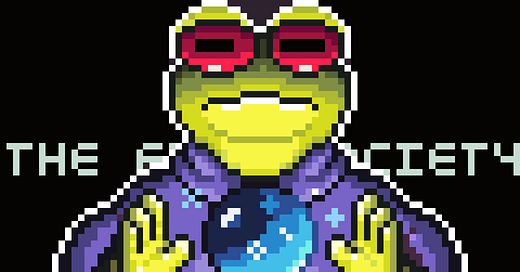



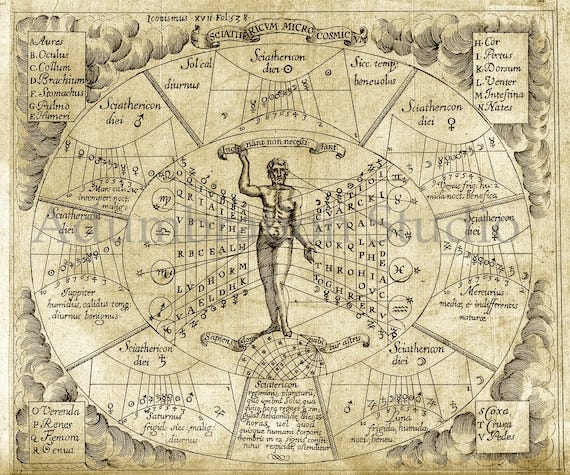
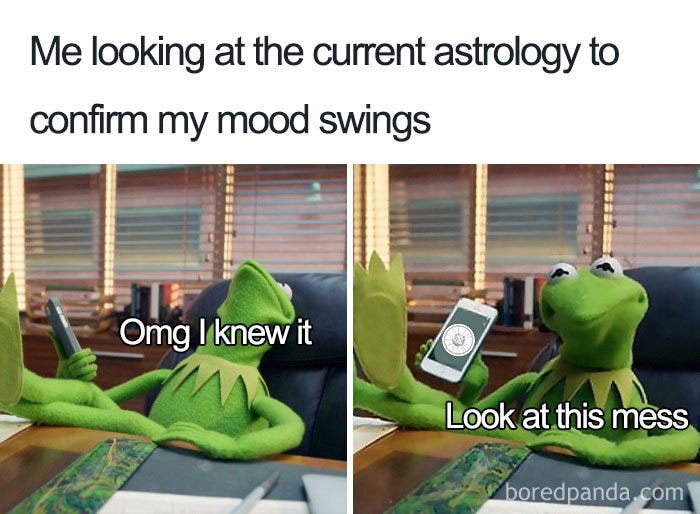
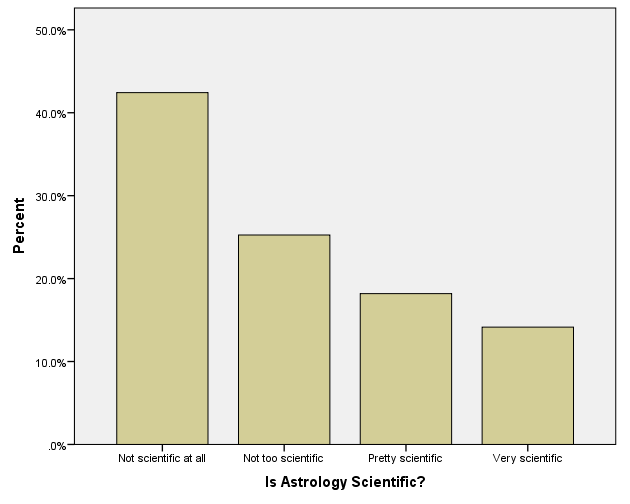
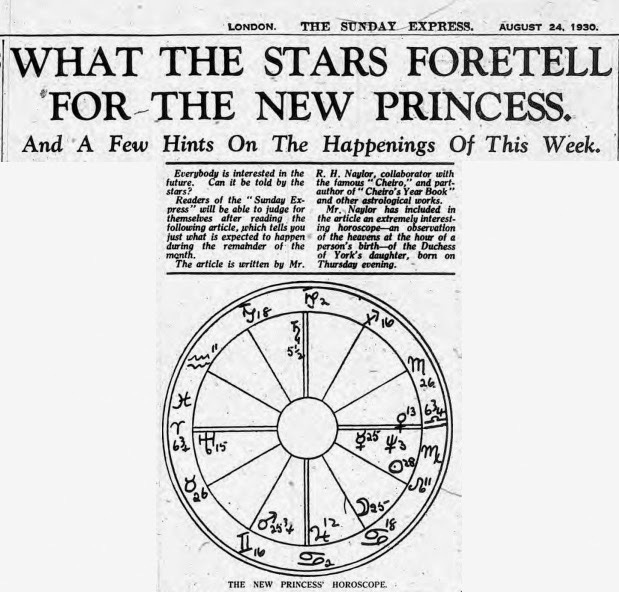
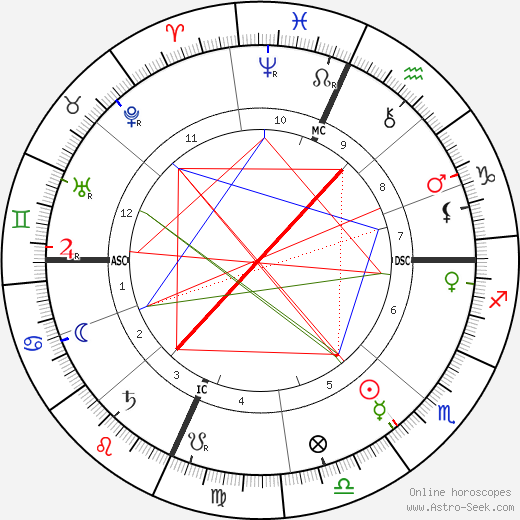
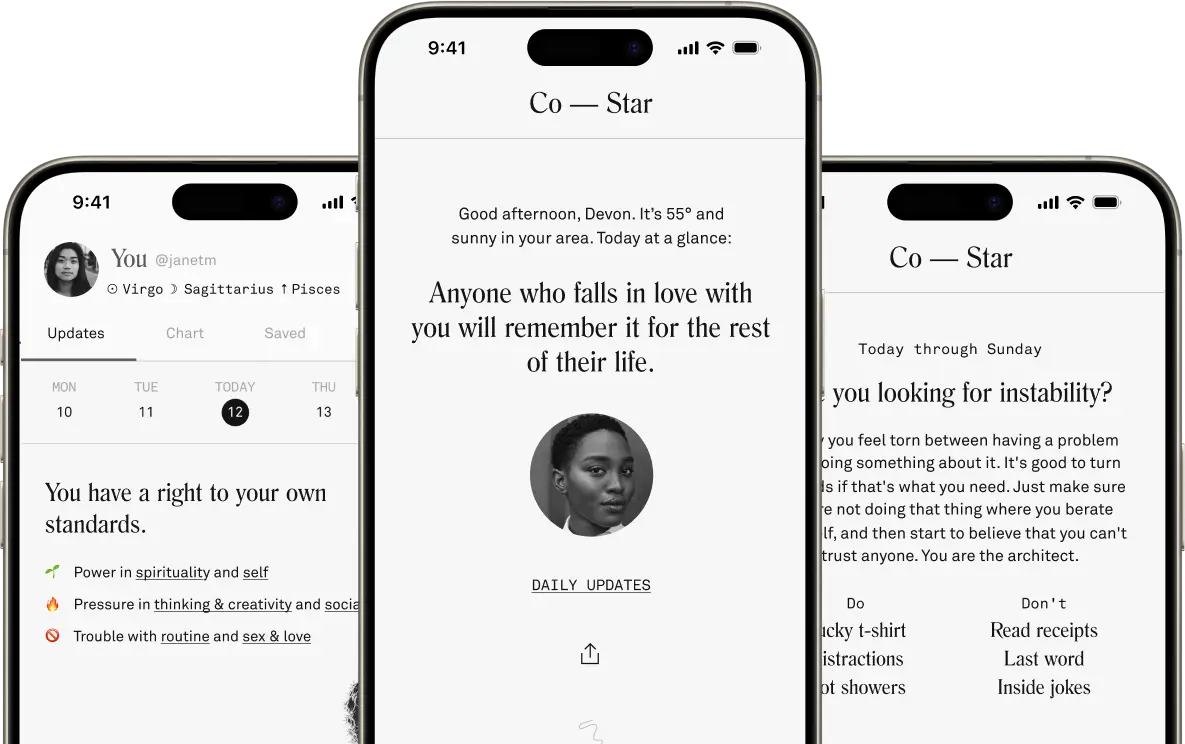
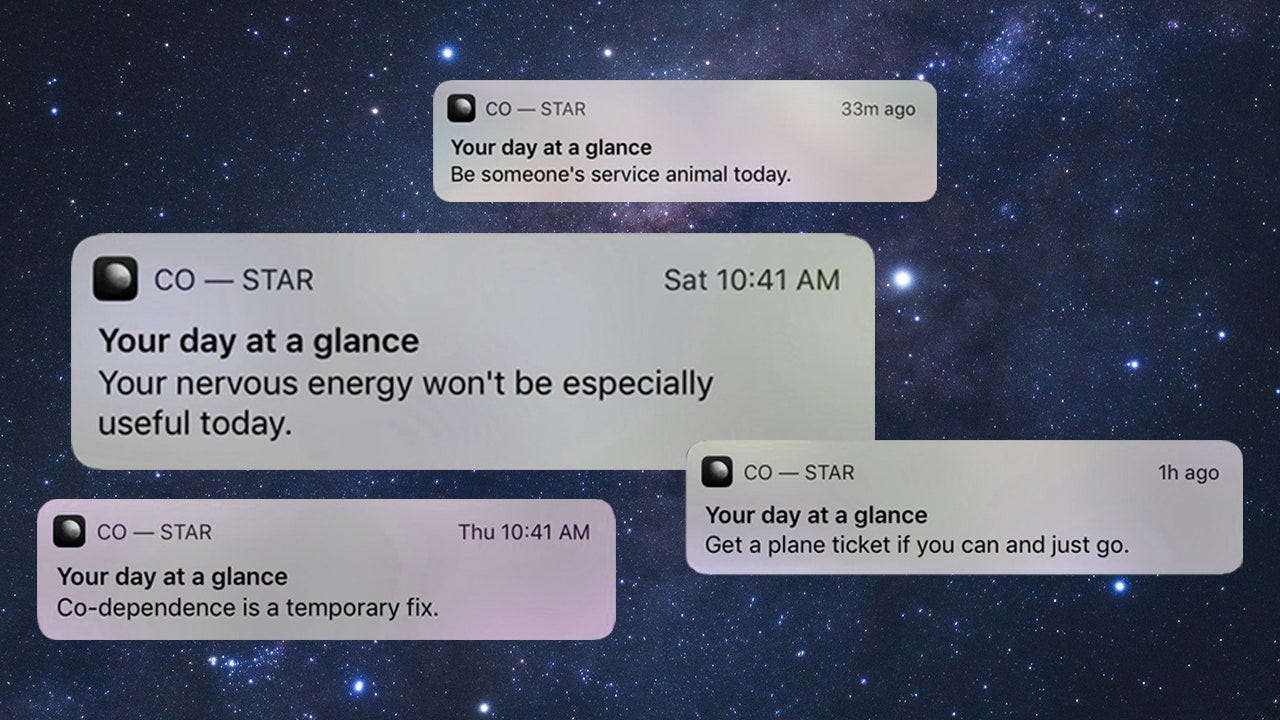
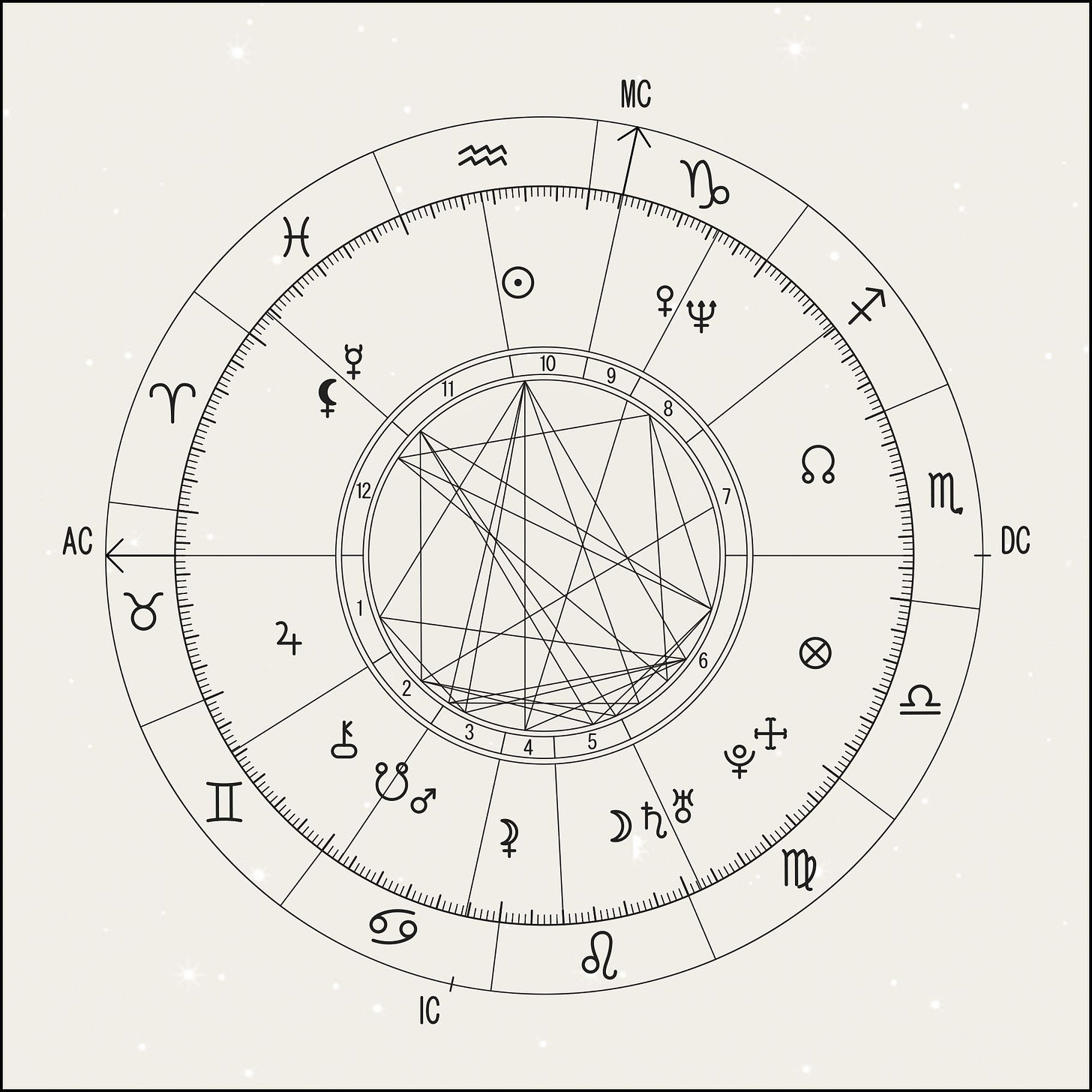
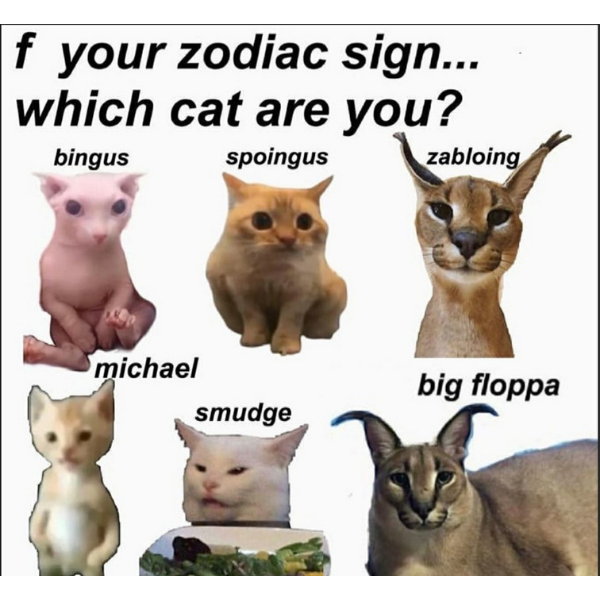
Wow, t k biết là Duy cũng quan tâm tới Astrology nhiều như v đó. T khá thích câu này trong bài của Duy: “maybe the universe has my back because the economy sure doesn’t“. Gần đây, t cũng hay hứng thú vs astrology và tự tìm tòi cách giải mã bđs, hành tinh, ý nghĩa của mỗi nhà, vị trí, góc chiếu,… để hiểu hơn về bản thân cũng như là tìm kiếm những hint trong năm tới sẽ ntn. Theo cá nhân t thì, bđs chỉ nên sử dụng để tham khảo và xem năng lượng tổng quan để mình biết và hiểu được những sự kiện có thể xảy ra trong cs, cũng như là mình có thể hình dung được hướng đi mình nên tập trung vào trong cs ít nhiều. Hiểu được và prepare for it would be better rather than blame Astrology for everything. Sometimes t cũng dùng nó để có một cách hiểu toàn diện hơn vs bạn bè, và từ đó suy ra cách để duy trì mqh ntn một cách hiệu quả hơn. Nếu biết cách tận dụng và kết hợp astrology vào đúng mục đích mình cần thì t nghĩ sẽ helpful lắm đó. Stay consciously spiritual 😎 loll
(Or maybe do t là ng chơi hệ tâm linh XD) Anyway, tks for you cool stuff nhaaa <3
Thank you so much for such an invested, thougtful post. I truly I adore this.
Below is my take on Astrology as a language just like any other languages, hope you like it <3
https://open.substack.com/pub/minivangettingaround/p/mot-polyglot-nghi-gi-khi-i-hoc-tieng?r=s2vsu&utm_campaign=post&utm_medium=web&showWelcomeOnShare=true